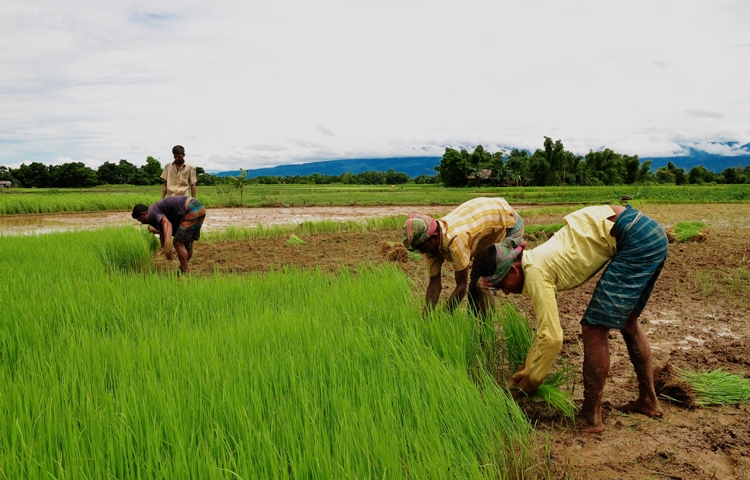FEATURE-As rain grows patchier, Andaman and Nicobar island farmers adapt

- Country:
- India
Tapan Mondal used to grow rice, when the rainfall over India’s Andaman and the Nicobar Islands was still reliable in the dry season, showering the thin layer of island soil with enough moisture for crops to survive until the monsoon.
Now, however, the 49-year-old's island is much drier, and what he is growing has changed. Near a pond dug into his fields to trap rainwater, chilis, tomatoes, cauliflower and other vegetables now sprout. The pond, covered with a tarp to ward off evaporation, also allows him to raise fish to eat and sell.
Water seeping from the pond into surrounding soil nourishes banana and papaya trees as well, with long roots that can suck up scarce moisture. The changes mean he now earns more than he used to from growing rice - but crop quality has declined, he said, perhaps because of higher temperatures and longer dry spells.
As climate change takes hold, the Andaman and Nicobar Islands, in India's Bay of Bengal, are seeing more irregular rainfall. It’s an enormous problem for farmers no matter where they sow their crops - on the thin coastal soil of the Andamans or the porous coral soil of the Nicobars. Both struggle to absorb and hold much water.
The number of rainy days and the amount of rainfall the islands receive during the dry winter season have dropped in recent years, according to data from 1949-2014 compiled by scientists at the India Meteorological Department and the Central Island Agricultural Research Institute. In these islands, said Ayyam Velmurugan, a soil scientist with the institute, two weeks of sunshine can suck the soil dry, turning a flood quickly into a drought.
Farmers on India's mainland can sometimes dig for groundwater to make up for a lack of rain, but coastal Andaman soil isn’t deep enough to hold much water, and digging into the coral soil of the Nicobar islands can flood a field with saltwater, scientists say. All this is creating challenges for the 380,000 people who live on the archipelago, more than a quarter of them in the capital, Port Blair, according to data from the last nationwide census in 2011.
RAIN WOES
One of the problems facing the drying Andaman islands is that the deepest soil - that good at soaking up rain - lies in the interior regions that are largely mountainous, forested and undeveloped, Velmurugan said.
Moving water from inland areas to the coast is too costly, he said. In total, rainfall over the Andaman and Nicobar Islands still hovers near its historical average, Velmurugan said - but now more of it comes during the monsoon, often in heavy cloudbursts. The Indian Ocean has warmed more consistently than the Atlantic and Pacific, according to Roxy Koll, an Indian Ocean warming expert at the Indian Institute of Tropical Meteorology who is currently a visiting scientist at the U.S. National Oceanic and Atmospheric Administration.
The warming waters increase evaporation and cause bursts of rain that can erode away soil, scientists say. This is a constant problem on the Andaman and Nicobar Islands, where morning droplets of rain can flow out to sea by afternoon, As warming continues, “you can expect this over most of the islands over the Indian Ocean,” Koll warned. “It will only add to the agriculture woes.”
FORECASTING
Velmurugan pulled his office door shut on a recent March evening and walked down the hallway, shuffling papers holding district-level weather predictions for the islands’ next three days. The predictions are blasted out twice a week via Whatsapp and text and broadcast on local radio and television news. They’re also printed in newspapers, published online, and posted in village resource centres on remote islands, where tribal farmers can access the information.
Knowledge is a crucial resource in a place where the managing climate is an almost everyday affair and farmers need to know when they can capture even a few drops of rain, Velmurugan said. “Which component of the climate is the problem?” Velmurugan asked. “We have to map it, and identify the trend.”
Velmurugan encourages farmers to grow fruit and other tree crops because the long roots of trees can access deeper moisture - and because intense cyclones, which can rip out trees, don't hit the Andaman and Nicobar Islands as often as island nations such as Japan or the Philippines. A thick canopy of banana and coconut leaves also can shield the land beneath from fierce rainfall.
Velmurugan wants farmers to now use water as efficiently as their land. When it rains, “you have to think it is an opportunity, so when you have that opportunity you have to use it,” he said.
(With inputs from agencies.)
ALSO READ
TVK chief Vijay alleges some 'gain' for ruling DMK dispensation in the proposed Parandur airport project, says people understand it.
TVK chief Vijay slams DMK regime as 'anti-people' for trying to bring airport by destroying 90 percent farmlands, waterbodies.
We pray for highest penalty to maintain people's faith in society: CBI lawyer tells court ahead of sentencing in RG Kar case.
UPDATE 5-Trump pardons 1,500 people charged with Jan. 6 US Capitol riot
Boosting Sports Development in the Andaman and Nicobar Islands










